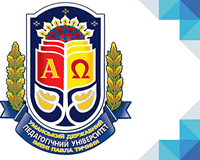Please use this identifier to cite or link to this item:
https://dspace.udpu.edu.ua/handle/6789/9483| Title: | THE STUDY OF FUTURE PSYCHOLOGISTS’ PERSONAL POTENTIAL IN THE PROCESS OF THEIR PROFESSIONAL DEVELOPMENT |
| Authors: | Maryna Mishchenko Nataliia Shelenkova |
| Keywords: | individual psychological features future psychologists professional potential communicative potential |
| Issue Date: | 2018 |
| Citation: | Maryna Mishchenko, Nataliia Shelenkova The Study of Future Psychologists’ Personal Potential in the Process of Their Professional Development Science and education. – Odessa, 2018. – Issue 5. Psychology. – P. 12–18. |
| Abstract: | The paper presents the study of the existing level of development of future psychologists’ individual psychological features that make up their personal potential in the process of professional development. The content characteristics of personal potential in relation to professional training have been demonstrated. Effective formation of personal potential of a specialist can be provided in the process of his/her studying at the higher educational institution, being implemented comprehensively in the following areas: cognitive, motivational, operational, reflexive, and spiritual. It has been found that the impact of future psychologists’ individual psychological features on the process of their professional development forms the system of interdependent conditions and factors that increase the level of professional development. This system includes activity-related component (the unity of the subject and the content, common character of the activities performed by students in the process of training); motivational component (the unity of goal and motivational orientation of a future psychologist); communication component (the kind of communication between future psychologists); personality-related component (common value orientations, senses and personal consonance between psychology students); spiritual component (future psychologists’ abilities to distinguish and choose intrinsic moral values, such as goodness, love, beauty, sincerity, freedom, responsibility and subject their actions, which form spiritual and psychological unity with other people in communication and work, to them). The comprehensive diagnostic assessment of future psychologists’ individual psychological characteristics was carried out with the use of the following techniques: J. Holland’s theory of personality types, diagnostics of achievement motivation modified by M. Magomed-Eminov (aimed at defining future psychologists’ professional potential); life purpose test by O. Leontiev; O. Potomkina’s modified technique aimed at determining socio-psychological attitudes of a personality used for finding future psychologists’ values and senses; updated variant of the error inventory by A. Freeman – R. Dewolf (for estimating psychology students’ communication skills); M. Noskov’s technique; inventory “Evaluation of Spirituality Level” developed by O. Horbachov (aimed at estimating psychology students’ spirituality). The results of psychodiagnostic tests have made it possible to obtain and systemize experimental data characterizing the diversity of psychology students’ motivational, communicative, value orientation, professional, personal, and moral characteristics, which together form each student’s personal potential. The results obtained can be applied for the preparing of a special program aimed at the development of future psychologists’ individual psychological features that are responsible for their professional development |
| URI: | http://dspace.udpu.edu.ua:8181/handle/6789/9483 |
| Appears in Collections: | Факультет соціальної та психологічної освіти |
Files in This Item:
| File | Description | Size | Format | |
|---|---|---|---|---|
| web of science.pdf | 791,82 kB | Adobe PDF | View/Open |
Items in DSpace are protected by copyright, with all rights reserved, unless otherwise indicated.

